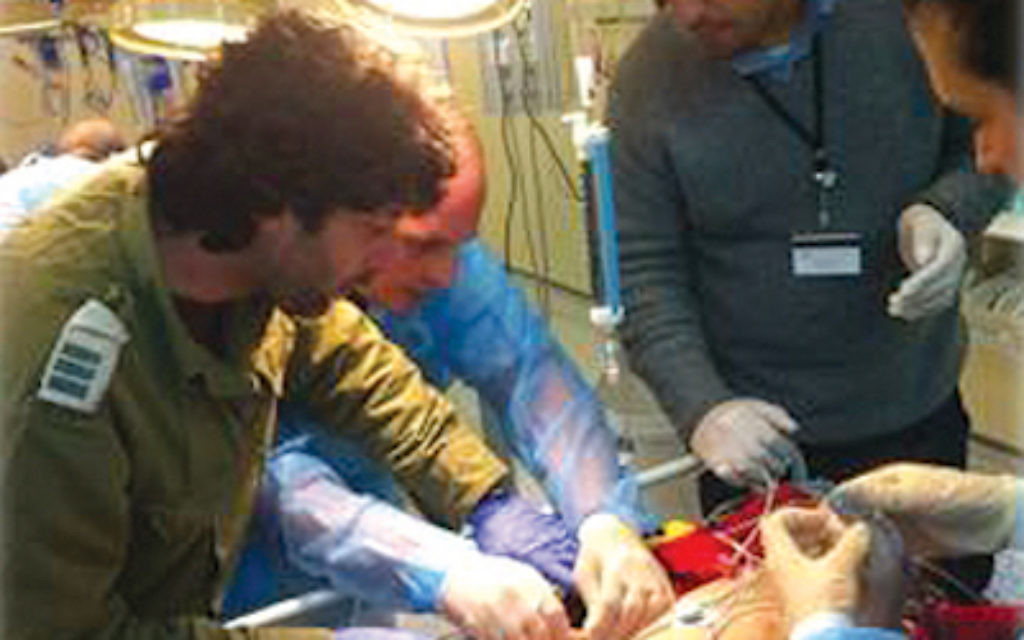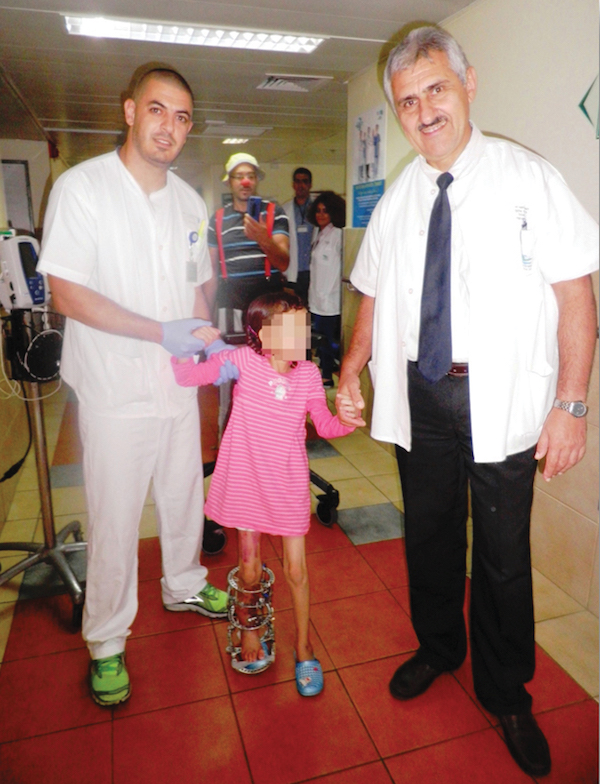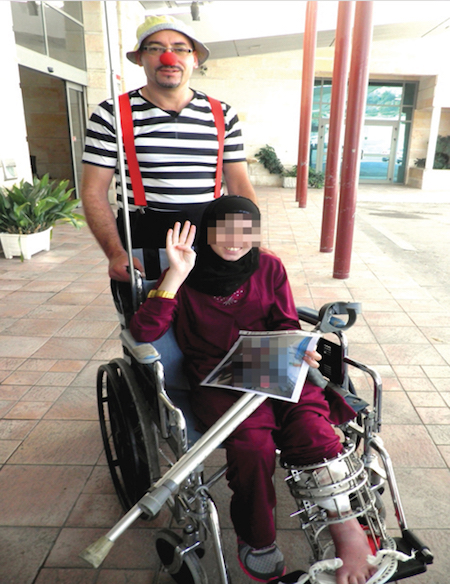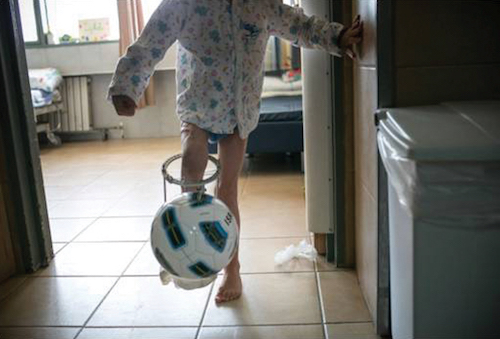Love your enemies: How Israel became the good guy in the Golan
Jenni Frazer investigates Israel special hospital for Syrians, which has been helping victims of the civil war north of the border

To make something happen sometimes needs a spark of imagination and a belief that anything is possible.
In June 2014, I was in Israel at a Jewish media conference. The foreign ministry, which had devised the programme, offered “away days” for delegates: time in the West Bank on a settlement, visiting an industrial zone in the north, that sort of thing.
As a former Jerusalem correspondent, I found the options dull and was debating what would be the least worst choice. But then we were summoned to hear an address from Prime Minister Benjamin Netanyahu, and among the well-worn clichés, something suddenly leapt out.
Get The Jewish News Daily Edition by email and never miss our top stories Free Sign Up
Netanyahu spoke about Israel’s historic role as “a light unto the nations” and, as an example, referred to a field hospital on the northern border that was treating… Syrians.
I begged to go to see this in action, but the foreign ministry insisted the prime minister had spoken out of turn, and refused to allow journalists to take the story further. Astonishingly, from 2014 to late last year, Israel, famously leaky, managed to keep a lid on the story, citing security considerations.

But it was becoming clear Israel, ever subject to a bad press, was sitting on something remarkable. Little by little, what the medics of the northern hospitals and the Israeli army were doing, and the numbers of Syrians, fighters and civilians, being treated, became an irresistible story.
One day over lunch I mentioned it to award-winning film-maker David Cohen and a lightbulb moment happened. This, he said, could make a terrific film.
This is how Cohen, cameraman Asi Avias and I ended up in a pitch-dark clearing somewhere on the Golan Heights, waiting for random wounded Syrians to come over the border and be taken for treatment to hospitals in Safed or Nahariya. It was a waiting game, but, as our army escort told us, there was no guarantee when or whether people might arrive.

To be here, we had to overcome many difficulties, including the fact that much as we might beg, we were not going to get some of the big names we wanted to interview.
We also misunderstood how much bureaucracy was involved, but eventually the wrinkles were ironed out.
We had a politician lined up – former Defence Minister Moshe Ya’alon, under whose aegis the help to Syrians had begun.
We had the hospitals and the medics good enough to spare time to talk to us, the ground-breaking surgeons, the nurses, the social workers, the musicians who played in the hospital corridors to cheer people up, the “dream doctors” — clowns to you and me, who helped to win the children’s trust — and, yes, some Syrian patients.
What we didn’t have was anyone saying treating the Syrians was a bad idea. Every person we spoke to, close to or far from the project, took pride in what Israel was doing.

On the last possible night of our filming schedule, magically, it all came together. Nothing looked promising in the dark clearing where we were told to meet the IDF teams when, suddenly, one of the soldiers got a call and the signal went out to the two ambulances to head to the border. In short order, they were back with their wounded.
Drivers assumed their places. Paramedics, men and women, performed triage on the Syrians inside the ambulances. One Syrian wearily held up a hand, flashing a V for victory sign. It was about the only bit of him that hadn’t been shot at.
In under 20 minutes, the whole caravan disappeared as the ambulance trucks made their way to the most appropriate hospital to treat the injuries recorded. It was an astonishing operation, skilled and organised down to the last inch.
It’s not often you witness a modern-day miracle, but that’s how it seemed to me as we drove away. With help from the Israel-British Alliance, we have made — in my opinion — a really great film. It’s called Love Your Enemies.
Sometimes all it takes is a spark of imagination and an ambition, realised by Cohen, to tell an incredible story.
- The DVD will be available priced £7.99 including p&p from Psychology News at dcpsychologynews@gmail.com.
- Love Your Enemies was screened in Westminster in November under the aegis of the Israel-British Alliance and the Labour and Conservative Friends of Israel

Thank you for helping to make Jewish News the leading source of news and opinion for the UK Jewish community. Today we're asking for your invaluable help to continue putting our community first in everything we do.
For as little as £5 a month you can help sustain the vital work we do in celebrating and standing up for Jewish life in Britain.
Jewish News holds our community together and keeps us connected. Like a synagogue, it’s where people turn to feel part of something bigger. It also proudly shows the rest of Britain the vibrancy and rich culture of modern Jewish life.
You can make a quick and easy one-off or monthly contribution of £5, £10, £20 or any other sum you’re comfortable with.
100% of your donation will help us continue celebrating our community, in all its dynamic diversity...
Engaging
Being a community platform means so much more than producing a newspaper and website. One of our proudest roles is media partnering with our invaluable charities to amplify the outstanding work they do to help us all.
Celebrating
There’s no shortage of oys in the world but Jewish News takes every opportunity to celebrate the joys too, through projects like Night of Heroes, 40 Under 40 and other compelling countdowns that make the community kvell with pride.
Pioneering
In the first collaboration between media outlets from different faiths, Jewish News worked with British Muslim TV and Church Times to produce a list of young activists leading the way on interfaith understanding.
Campaigning
Royal Mail issued a stamp honouring Holocaust hero Sir Nicholas Winton after a Jewish News campaign attracted more than 100,000 backers. Jewish Newsalso produces special editions of the paper highlighting pressing issues including mental health and Holocaust remembrance.
Easy access
In an age when news is readily accessible, Jewish News provides high-quality content free online and offline, removing any financial barriers to connecting people.
Voice of our community to wider society
The Jewish News team regularly appears on TV, radio and on the pages of the national press to comment on stories about the Jewish community. Easy access to the paper on the streets of London also means Jewish News provides an invaluable window into the community for the country at large.
We hope you agree all this is worth preserving.
-
By Brigit Grant
-
By Laurent Vaughan - Senior Associate (Bishop & Sewell Solicitors)
-
By Laurent Vaughan - Senior Associate (Bishop & Sewell Solicitors)
-
By Laurent Vaughan - Senior Associate (Bishop & Sewell Solicitors)
-
By Laurent Vaughan - Senior Associate (Bishop & Sewell Solicitors)





















